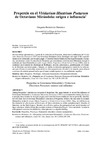Please use this identifier to cite or link to this item:
https://accedacris.ulpgc.es/jspui/handle/10553/72180
| Title: | Propercio en el Viridarium Illustrium Poetarum de Octaviano Mirándola: origen e influencia | Other Titles: | Propertius in Octavianus Mirandula's Viridarium Illustrium Poetarum: sources and influence | Authors: | Rodriguez Herrera, Gregorio | UNESCO Clasification: | 6202 Teoría, análisis y crítica literarias | Keywords: | Propertius Florilegia Humanistic Education Literary Manipulation Propercio, et al |
Issue Date: | 2010 | Journal: | Cuadernos de filología clásica. Estudios latinos | Abstract: | \Taking Propertius' selection as our point of departure, this paper intends to reveal the influence of Octavianus Mirandula's Viridarium Illustrium Poetarum (1507) on seventeenth-century florilegia, especially those written by Joseph Langius and Cristobal Garcia Guillen de Paz respectively. Similary, we will show how Octavianus Mirandula's selection of Propertius follows the one made by Ioannes Murmellius in his Ex elegiis Tibulii, Propertii et Ovidii Selecti Versus (1504). Thus, we will focus on the character of "florilegium of florilegia" of these selections or, rather, paraphrasing G. Genette, of literature "in the third degree". Besides, we will also analyse the pedagogical and moral intention of these selections, which obviate the essential contents of Propertian Elegies - love and death - in order to offer general sententiae in which love, when present, is a negative feeling. En este trabajo pretendemos, a partir de la selección de Propercio, demostrar la influencia del Viridarium Illustrium Poetarum (1507) de Octaviano Mirándola en los florilegios del siglo XVII, especialmente en los elaborados por Joseph Langio y Cristóbal García Guillén de Paz respectivamente. asimismo, mostraremos cómo la selección de Propercio que encontramos en Octaviano Mirándola recogió la realizada por Juan Murmellio en su Ex elegiis Tibulii, Propertii et Ovidii Selecti Versus (1504). así, insistiremos en el carácter de «florilegio de florilegios» de estas selecciones o, parafraseando a G. Genette, de literatura «en tercer grado». además, se analiza la intención pedagógica y moral de las selecciones que obvian el contenido esencial de la obra properciana: el amor y la muerte, para ofrecer sententiae de carácter general en las que el amor, cuando aparece, es un sentimiento negativo. |
URI: | https://accedacris.ulpgc.es/handle/10553/72180 | ISSN: | 1131-9062 | Source: | Cuadernos De Filologia Clasica-Estudios Latinos [ISSN 1131-9062],v. 30 (2), p. 295-320 |
| Appears in Collections: | Artículos |
WEB OF SCIENCETM
Citations
4
checked on Feb 25, 2024
Page view(s)
54
checked on Jan 10, 2026
Download(s)
22
checked on Jan 10, 2026
Google ScholarTM
Check
Share
Export metadata
Items in accedaCRIS are protected by copyright, with all rights reserved, unless otherwise indicated.
